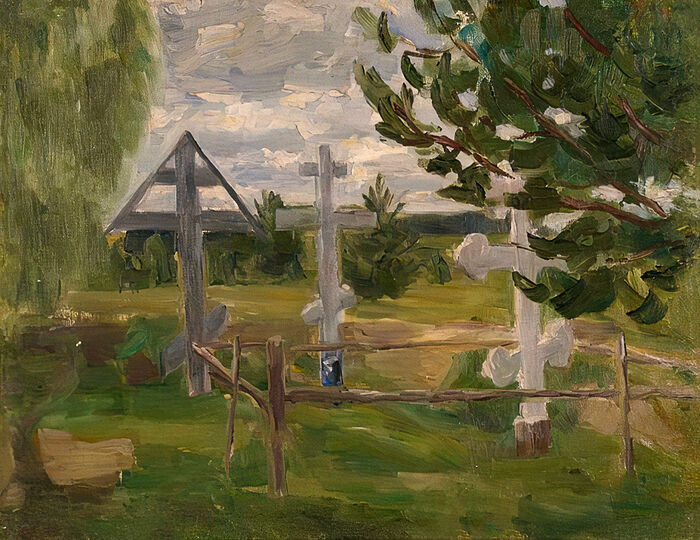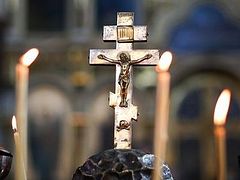Death, that fate of all men upon the earth, a fate inevitable for all! We shrink from it as from a most cruel enemy. We bitterly lament those who have been taken by it. Nevertheless, we lead our life as though it were not, as if we were eternal upon the earth.
My grave! O why do I forget you? You await me, you wait—and no doubt I shall become your inhabitant. O why do I forget you? And why do I act as if the grave were the lot only of others, but not at all that of mine own?
Sin has taken away and does ever remove from me the knowledge and perception of every truth. It deprives and banishes from my thoughts any recollection of death, of that event so tangibly true and important for me.
In order to remember death, one must lead a life in conformity with the commandments of Christ. Christ’s commandments purify the mind and heart, mortify them to the world, and renew them for Christ. A mind once detached from earthly passions begins often to turn its gaze towards its mysterious passage into eternity, towards death. A purified heart begins to perceive its death ahead of time.
The mind and heart when detached from the world strive towards eternity. As soon as they have loved Christ, they have an unquenchable thirst that they might stand before him, yet nevertheless tremble at the hour of death, contemplating the majesty of God and their own nothingness and sinfulness. For them death seems both a fearful feat (podvig), and also that coveted deliverance from earthly captivity.
If we find ourselves unable to desire death by reason of our coldness towards Christ and on account of our love towards things corruptible, then let us at least use remembrance of death as a bitter medicine against our sinfulness since “remembrance of mortality”—that’s what the Holy Fathers call this remembrance—as soon as it has been assimilated by the soul, cuts off its friendship with sin with all its sinful pleasures.
Only he who has become familiar with the thought of his end, said one holy father, can put an end to his sin. “In all thy works remember thy last end, and thou shalt never sin” (Sirach 7:40).
Rise from your bed as if rising from the dead. Lie down upon your bed as if you were lying in your grave. Sleep is an icon of death, and the darkness of night—a harbinger of that sepulchral darkness after which the light of resurrection shall shine—a light joyous for the servants of Christ, but terrifying for His enemies.
A thick cloud, although it consists of nothing other than thin layers of moisture, covers the light of the sun. So likewise do bodily delights, distraction, and frivolous earthly cares block eternity in all its majesty from the gaze of the soul.
In vain does the sun shed its light in clear skies for eyes struck by blindness. So also, it is as if eternity does not exist for a heart possessed by earthly passion, passion for all that is great, glorious, and sweet upon the earth. “Cruel is the death of sinners” (Psalm 33:22 LXX). It [death] comes to them at a time completely unexpected for them. It comes to them, but they haven’t made any preparation neither for death, nor eternity. They haven’t even acquired any clear conception of either of these matters. Death snatches unprepared sinners from the face of the earth upon which they have only angered God and sends them eternally to the dungeons of Hell.
Do you wish to remember death? Maintain strict moderation in food, clothing, and with respect to all your household possessions; take heed lest objects of necessity become objects of luxury. Meditate upon the law of God day and night, or as often as is possible, and thereby you will remember death. Remembrance of death will be accompanied by torrents of tears, repentance of one’s sins, the intention to correct oneself, and with many fervent prayers.
Who among men has remained upon the earth that he might live forever? Not one. And in this too I will follow my fathers, forefathers, brothers, and my relatives. My body shall retire into the black grave, and my lot will be hidden from those who remain upon the earth by an impenetrable mystery.
My relatives and friends shall mourn for me, perhaps, they shall even weep bitterly. Afterwards, though, they shall forget. So likewise, there have been countless thousands of people, mourned and then forgotten thereafter. They are all numbered and remembered by the one and all-perfect God alone.
Scarcely had I been born, scarcely had I been conceived, when death had set his seal upon me. “He is mine,” said he, and immediately he made ready his scythe for me. From the very beginning of my existence, he has been swinging his scythe about. Any minute I could be made the victim of death! There have been many near misses, but a sure swing and blow are inevitable.
Death looks upon all the earthly works of men with a cold smile of contempt. The builder builds his massive building, the painter has yet to finish his masterpiece, the genius has come up with sweeping plans, and desires to bring them to fruition. [At that moment] comes death, unexpected and inexorable, and reduces all his intentions to naught.
Pitiless death, conquered by Christ, reveres only the servant of Christ; he respects only that life which is in Christ. Often a heavenly messenger announces to the servants of the Truth their imminent passing into eternity and their blessedness therein. Those who have prepared for death with their life, having the consolation both of the witness of their conscience and of the promise that is from above, peacefully and with a smile on their lips fall asleep into the long sleep of death.
Has anyone ever seen the body of a righteous man, separated from its soul? You will notice no stench issuing forth from his body, nor is it frightening to approach it. At his burial sorrow is dissipated by some kind of incomprehensible joy. Sometimes his facial features, frozen as they were at the last moments of the departure of his soul, rest in a very deep calm, and sometimes upon his countenance shines the joy of a most sweet greeting and encounter with the angels and choir of the saints sent from heaven to receive the souls of the righteous.
O that I might remember my death! Come unto me, O bitter, yet just and profitable remembrance [of death]. Deliver me from sin! Guide me onto the path of Christ! And let my hands thereby grow lax in every empty, vain, and sinful undertaking.
O that I might remember my death! And may vainglory and love of pleasure flee from me. I shall remove from my table luxurious dainties, put off my pompously splendid garments, and put on a mourning garment. Then I shall mourn myself whilst still alive, I who have been marked a dead man since my birth.
“And so,” says the remembrance of death, “remember and mourn for yourself while yet among the living. I have come to grieve you beneficently and have brought with myself a host of thoughts which are of great profit to the soul! Sell what you have in excess, and the price thereof distribute unto the poor. Send thereby your treasures to heaven according to the Savior’s will. They will meet their owner there, multiplying a hundredfold. Shed ardent tears and pour fourth fervent prayers for yourself. Who can with such care and diligence remember you after death as you yourself can before your own death? Entrust not your salvation to another when you yourself can do this most necessary thing! Why do you chase after corruption when death most assuredly shall deprive you of all that is corruptible? He [death] is the executor of the commands of the all-holy God. Should he but hear the command, forthwith does he rush with lightning speed to the execution thereof. He shall pay no regard for the rich, nor the noble, whether he be hero or genius, neither shall he spare youth, beauty, nor earthly happiness; all alike shall he send into eternity. The servant of God enters into the bliss of eternity, but God’s enemy—into eternal torment.”
“Remembrance of death is a divine gift,” said the holy fathers. It is given to those who keep the commandments of Christ in order to perfect him in his holy struggle (podvig) of repentance and salvation.
Grace-given remembrance of death is preceded by one’s own efforts to remember death. Force yourself often to remember death; assure yourself of the undoubted truth that you shall certainly—at a time yet unbeknownst to you—die, and the remembrance of death will begin to come of its own accord; an incredibly profound and striking remembrance of death will begin to manifest itself before your mind’s eye. It will deal mortal blows to all your sinful undertakings.
Such a spiritual gift is foreign to the lover of sin. Even when he stands before the grave itself, he ceases not to give himself over to the sinful pleasures of the flesh. He remembers not death, though it stands before him face to face. On the contrary the servant of Christ, even whilst in the magnificent chambers [of kings], remembers the grave that awaits him, and sheds forth salvific tears on behalf of his soul. Amen.




